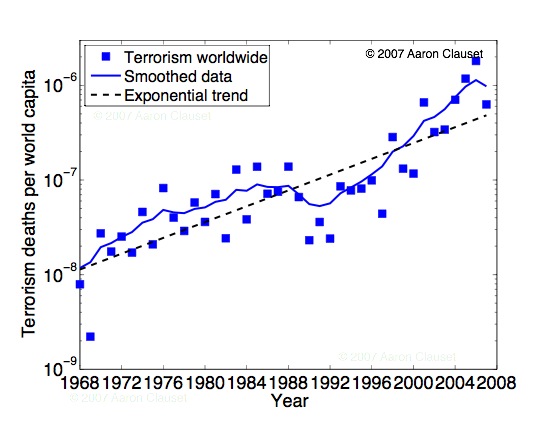« Is terrorism getting worse? A look at the data. | Main | DIMACS Workshop on Computational Methods for Dynamic Interaction Networks »
September 12, 2007
Is terrorism getting worse? A look at the data. (part 2)
Cosma and Matt both wanted to see how the trend fares when we normalize by the increase in world popluation, i.e., has terrorism worsened per capita. Pulling data from the US Census's world population database, we can do this. The basic facts are that the world's population has increased at a near constant rate over the past 40 years, going from about 3.5 billion in 1968 to about 6.6 billion in 2007. In contrast, the total number of deaths per year from terrorism (according to MIPT) has gone from 115 (on average) over the first 10 years (1968 - 1977), to about 3900 (on average) over the last 10 years (1998 - 2007). Clearly, population increase alone (about a factor of 2) cannot explain the increase in total deaths per year (about a factor of 34).
However, this view gives a slightly misleading picture because the MIPT changed the way it tracked terrorism in 1998 to include domestic attacks worldwide. Previously, it only tracked transnational terrorism (target and attackers from different countries), so part of the the apparent large increase in deaths from terrorism in the past 10 years is due to simply including a greater range of events in the database. Looking at the average severity of an event circumvents this problem to some degree, so long as we assume there's no fundamental difference in the severity of domestic and transnational terrorism (fortunately, the distributions pre-1998 and post-1998 are quite similar, so this may be a reasonable assumption).
The misleading per capita figure is immediately below. One way to get at the question, however, is to throw out the past 10 years of data (domestic+transnational) and focus only on the first 30 years of data (transnational only). Here, the total number of deaths increased from the 115 (on average) in the first decade to 368 in the third decade (1988-1997), while the population increased from 3.5 billion in 1968 to 5.8 billion in 1997. The implication being that total deaths from transnational terrorism have increased more quickly than we would expect based on population increases, even if we account for the slight increase in lethality of attacks over this period. Thus, we can argue that the frequency of attacks has significantly increased in time.

The more clear per capita-event figure is the next one. What's remarkable is that the per capita-event severity is extremely stable over the past 40 years, at about 1 death per billion (dpb) per event. This suggests that, if there really has been a large increase in the total deaths (per capita) from terrorism each year (as we argued above), then it must be mainly attributable to an increase in the number of lethal attacks each year, rather than attacks themselves becoming worse.
So, is terrorism getting worse? The answer is typically no, but that terrorism is becoming a more popular mode of behavior. From a policy point of view, this would seem a highly problematic trend.

A. Clauset, M. Young and K. S. Gledistch, "On the Frequency of Severe Terrorist Attacks." Journal of Conflict Resolution 51(1): 58 - 88 (2007).
posted September 12, 2007 08:12 AM in Political Wonk | permalink
Comments
What events are the other two outliers (roughly 1975 and 1984)?
Posted by: Matthew Berryman at September 12, 2007 04:17 PM
Those were years with a single "unusually large" event, relative to the others in that period. In 1974, it was an airplane bombing that killed 88; the per capita average without this event is 1.09 dpb. In 1983, it was an early-morning suicide car bombing of the U.S. Marines' peacekeeping barracks in Beirut by Hezbollah that killed 241; without this event, the per capita average for that year is 1.45 dpb. The other is 2001, and the per capita average without the three 9-11 events (deaths of 2749, 44 and 189) is 0.73 dpb; without the New York attack only, it's 0.88 dpb. Notably, there was another "big attack" in 2001 that is less well known, and that was the bombing of a train in Angola that killed 252 by UNITA.
Posted by: Aaron at September 13, 2007 02:03 PM